Centenary of the International Municipal Movement
1913 - 2013
In 1913 in the Belgian town of Ghent, a group of Mayors and city administrators took the groundbreaking decision to continue their collaboration in a more permanent and structured manner and so was born the Union Internationale des VIlles. One hundred years later, the international municipal movement is still growing strong and the international community increasingly realizes that in order to truly address global issues, the local level must be at the heart of the solution.
The foundation of UCLG in Paris, 2004, was a major step in the international municipal movement as it succeeded in uniting the major local and regional government associations from across the globe. In view of this and as direct inheritor, UCLG has therefore been celebrating the centenary of the international municipal movement throughout 2013 that culminated in the World Summit of Local and Regional Leaders with a large-scale exhibition detailing the first 100 years of our movement.
The exposition took the form of a timeline measuring over 100 metres and organised in three strips:
- The upper strip illustrated the innovation and evolution of the international municipal movement that began in 1913;
- The middle strip illustrated important milestones in the history of Rabat and Morocco, hosts of 2013 World Summit and 4th UCLG Congress;
- The lower section presented in parallel the major social, cultural and political events that have shaped the last century and our present-day societies, in order to give a wider cultural understanding to the municipal movement.
The timeline was presented in Rabat, Morocco, from 1st to 4th October 2013, in the framework of the World Summit of Local and Regional Leaders and, following this event it was displayed in the 16 regions of the Congress host country, Morocco.
- Read the document "Testimonies", about the international municipal movement
- Visit the Flickr Album on the Centenary
- Check out the tag #100years to read all the articles about the Centenary

The international municipal begins with the creation of the Union Internationale des Villes in 1913 and the decision to maintain permanent relations between municipalities from all over the world to better serve their citizens.
The inter war years see few advancements however in the wake of WWII and in a bid to establish permanent peace, municipalities begin to cooperate and create links that supersede the conflicts of national governments.
1913
The international municipal movement is born, with the launch of the Union Internationale des Villes (UIV) in Ghent, Belgium. Participants at the International Congress of the Art of Building Cities and Organising Community Life decide to create the UIV – a permanent office for communication and documentation on municipal issues. The first seat of the association is in Brussels and a Provisional Council of 30 members is set up.
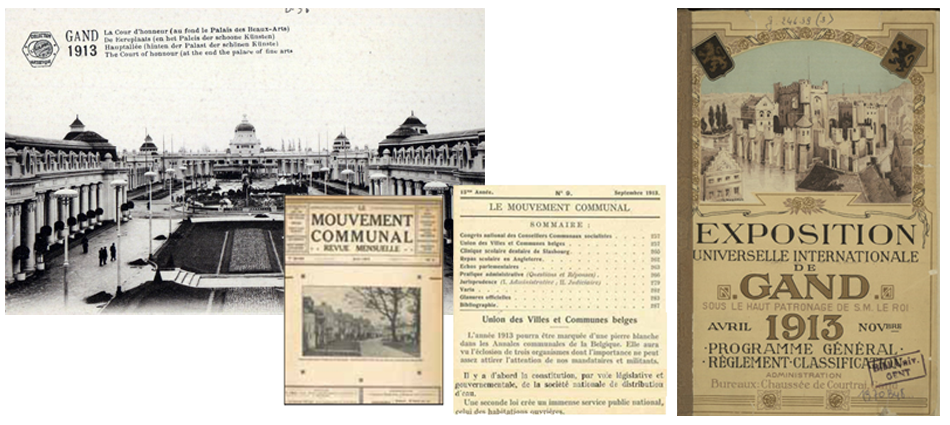
1914
August 1914: First World War begins. The UIV is unable to continue in any significant way, though a “provisional seat” was established at the offices of the Association of Netherlands Municipalities, VNG, in The Hague.
1918
World War I comes to an end and the founding fathers of the movement return to their respective countries, most survive the war intact
1919
Following the armistice, an appeal is made by UIV Secretary General Vinck for information, and for finance to support the work of the UIV.
1920
A meeting is held for UIV post-war promoters during the ‘Quinzaine Internationale’ (International Fortnight), held from 5th-20th September in Brussels, which included a ‘Town Planning and Local Government Section’. Henri Sellier, Mayor of Suresnes, and Dr Florentinus Marinus Wibaut, Alderman of Amsterdam are given the task of re-activating the Union Internationale des Villes. The founding fathers of the movement consider the League of Nations as potential partners.

1921
Despite financial constraints, Emile Vinck, Secretary General of UIV, creates the first Tablettes Documentaires Municipales (Documentary Notes on Municipal Affairs), a newsletter composed of texts and articles relating to municipal life from various member countries on municipal topics, such as urbanism, housing, sewage water, transport, public hygiene, and fires. This publication is put together in cooperation with the Internatinal Institute of Administrative Science and the International Federation for Housing and Planning.
1922
In September, a meeting is held in Paris entitled , “Preparatory Conference of the Promotors of the International Union of Local Authorities”. The decision is taken to hold a congress in Paris, and to organise an international documentation centre. In fact, the Paris Congress does not take place until 1925.
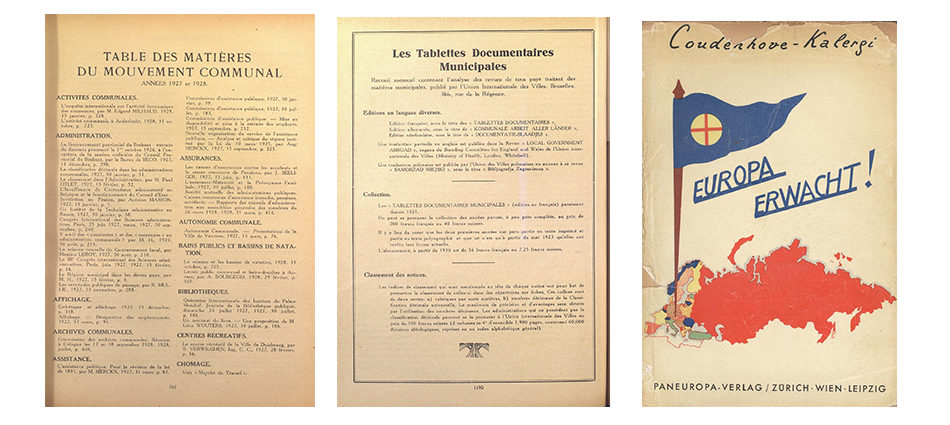
1923
Inter-municipal cooperation is placed on the agenda of 4th Assembly of the League of Nations via a resolution from Cuba on behalf of the Pan-American Union and the League’s Secretariat is requested to produce a report on this topic. Meetings take place between Emile Vinck and Ken Harada, the League Secretariat official in charge of the report, but do not lead to concrete conclusions.
1924
30th June: The 2nd UIV Congress is held in Amsterdam attempts to “establish permanent relationships between local authorities” and “develop interchangeable documentation” for its members. Dr F. M. Wibaut becomes President of UIV and Emile Braun and G. Cooreman Honorary Presidents. The Congress also addresses how the Union can contribute to the work of the League of Nations and of International Organisations and a committee is set up to organise the next Congress.
1925
3rd UIV Congress takes place in Paris addressing (1) systems of municipal government in various countries, (2) land use policy of local authorities and its influence on the problem of housing, and (3) large agglomerations. The Congress receives a major report from Mr G.Montagu Harris, then of the Ministry of Health in London, and who in future will play a major role in IULA’s life. Reports on the other subjects are made by Mr Droogleever Fortuyn, who later will be Mayor of Rotterdam, and by Mr Sellier, Mayor of Suresnes and Secretary General of the Union des Villes et Communes de France. Over 720 delegates attend the congress and it is decided to attempt to re-kindle links with the German union.
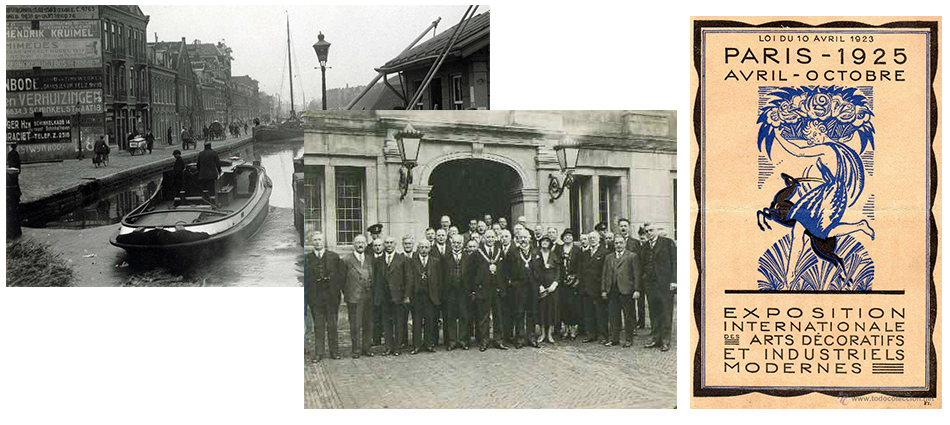
1926
It takes until the General Council meeting of Dusseldorf in October to create and normalise the permanent representative bodies of UIV. A new UIV publication, Les Sciences Administratives, complements the existing Tablettes Documentaires Municipales. By 1926, UIV boasts a network bringing together 52,000 cities in 30 different countries rendering effective service at both national and international levels.
1927
A special conference is held in Bern, Switzerland leads to recommendations on road traffic signs; these are later adoption by international bodies, including the League of Nations. This year marks a period of prosperity for the UIV as contact is made with North American municipalities who benefit from support from, among others, the Laura Spellman Rockefeller Memorial. The membership of the British, the return of the Germans and the expansion towards the east of Europe also helps fuel the Union’s growth. A supplement is added to the UIV newsletter: l’administration Locale.
1928
Following the success of Emile Vinck’s travels around the UK and North America in 1925 to raise the profile of UIV among the English-speaking world, the Union changes name to become the International Union of Local Authorities and moves towards becoming a Federation of National and Local Authorities.
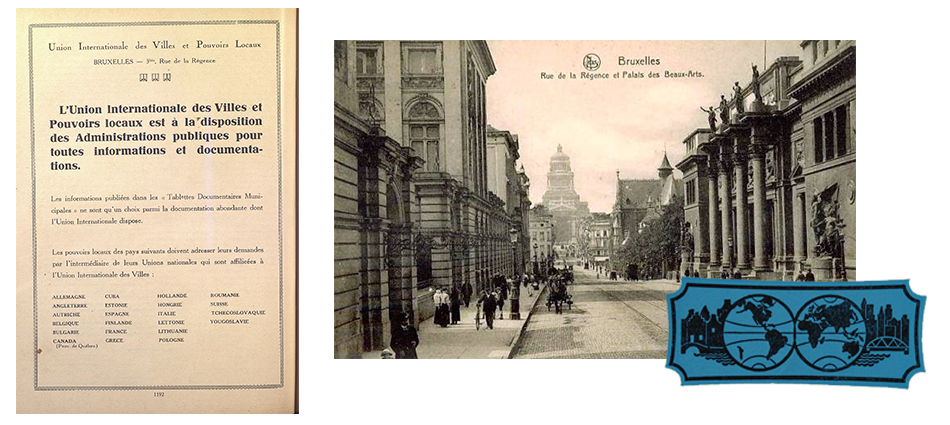
1929
4th IULA Congress begins in Seville and addresses the financial organisation of local authorities, community enterprises of an economic nature and expropriation of land for public utility. The 200 delegates then take the train to Barcelona, during the journey they are greeted by local delegations at every stop. Dictator and Prime Minister Primo de Rivera presides over a IULA meeting stating that the municipality, “is where the start of democratic government must lie”. This Congress attracts a large delegation from Latin America for the first time.
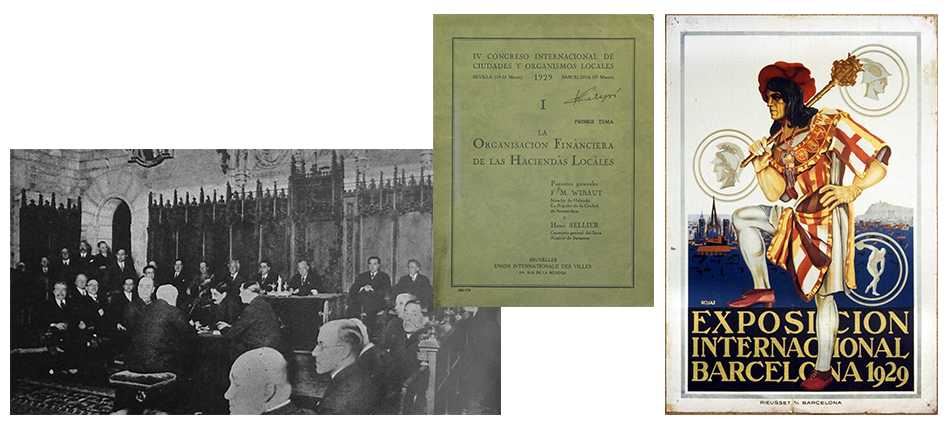
1930
IULA Conference in Liège-Antwerp in the framework of the centenary celebration of the foundation of the state of Belgium. The sessions address the issues of Insurances of local authorities against all risk and enterprises and communal services of a mixed nature. Jules Lespes’ book “local government in the United States” is published by IULA. Creation of International Institute of Administrative Sciences by the International Congress of Administrative Sciences held in Madrid.
1931
Key figures from the American municipal movement, later grouped under the Public Administration Clearing House (PACH), tour Europe over several weeks searching for potential European partners including IULA. Similar visits had taken place in 1930, and would again in 1932. The IULA committee responsible for organising and promoting congresses increases its efforts as advertisements for the 5th Congress are circulated one year before the event. The IULA publication adopts a new, more modern style.
1932
The 5th IULA Congress takes place in London, UK, with focus on the practical working of local authorities and training and strengthening municipal employees. Mr Montagu Harris presents a 31-country report on the first topic. The congress includes a number of study tours, including the “garden city” of Letchworth and Welwyn and featuring discussions with academics including Professors Robson, Tawney and Keynes. For the first time, reports from the Congress are published in English and German in addition to French. 28 Governments, 27 National Unions of local authorities, 252 municipalities from 40 countries and fifty organisations of municipal interest come together – some 924 participants.
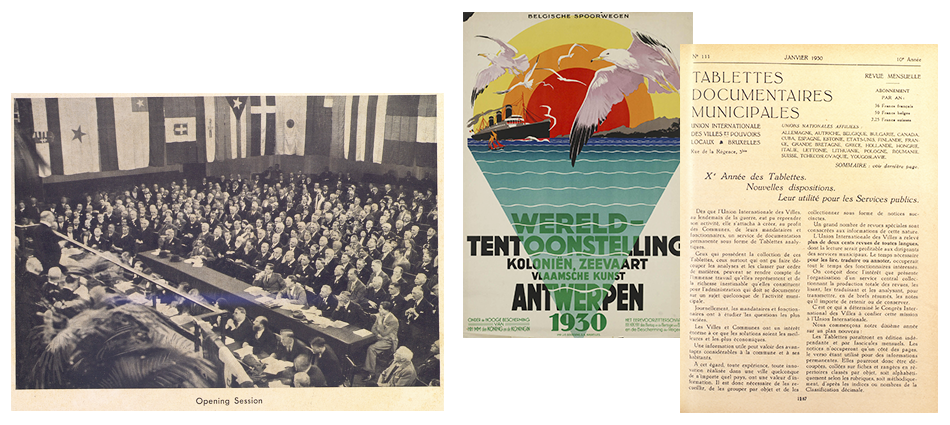
1933
George Montagu Harris visits the United States over 6 months to study municipal systems. He refers to the Public Administration Clearing House in Chicago under the management of Mr. Louis Brownlow, as one of the most valuable research institutions in America. He also tours throughout India and Japan and publishes the conclusions of this tour in his books “Westward to the East” and “Comparative Local Government”.
1934
The IULA Conference in Lyon, France gives focus on teaching topics of interest to municipalities, creating a communal science and the collection and destruction of home refuse. The American Committee for the International Union of Local Authorities is created and funded by the Rockefeller foundation to maintain relations with IULA. This group changes the way IULA operates and becomes the link between the American municipal movement and the various bodies working on municipal issues. The American financial contribution increases from 200 USD to 3,500 USD.
1935
The German financial contribution to IULA doubles from 5,000 to 10,000 Reichsmark ahead of the Berlin Congress, which was decided at the 1932 London Congress, shortly before Hitler is made Chancellor of Germany in January 1933. IULA decides to go ahead with the Congress in Germany despite the Nazi regime’s actions with the support of President Wibaut however he passes away before the Congress in early 1935 to be replaced by George Montagu Harris.
1936
The 6th IULA Congress in Berlin-Munich, Germany takes place with high absentee levels and deep concerns. A key report is presented on the fight of communities against unemployment. There is an exhibition during the Congress entitled, “the German Municipality” that is “a unilateral display of German municipal management achievements” (Stefan Coupernas*).This Congress marks the beginning of a wider, more international membership for the IULA outside of Europe and North America. John Stutz, President of the American Municipal Association, becomes Vice-President of IULA.
1937
IULA continues to organise conferences open to members on specialist topics like the fight against smoke, dust and toxic gas and the regulation and control of milk in Paris, France.
1938
Marking IULA’s 25th anniversary, a conference is held in Glasgow, UK, in the context of the Empire Exhibition, a colonial exhibition of the British Empire. The specialist conference addresses practical issues for municipal administrators including: treatment of sewage water and industrial waste and prevention of pollution of running water. Preparations begin on the 1940 Congress in Bucharest, however the Congress would never take place.
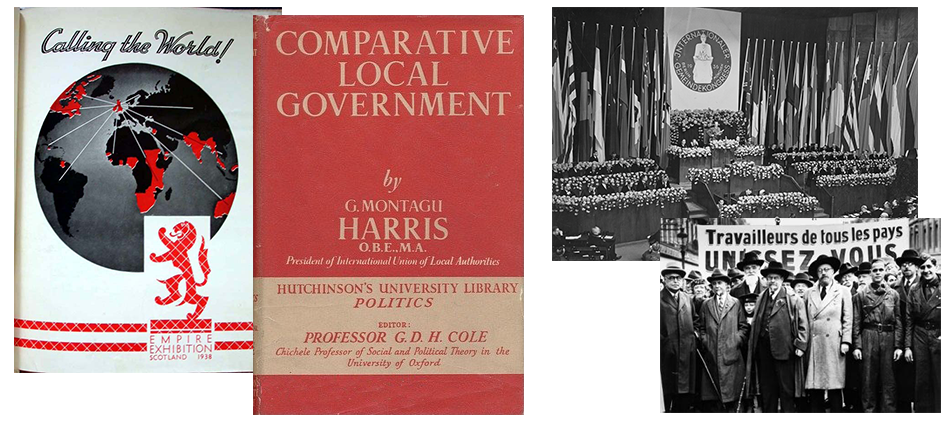
1939
In May, the city of Liège opens the Hydrologic International Exhibition to celebrate the success of the Albert cannel. IULA intended to hold a conference on this occasion but the exhibition closes prematurely in September because of the war. Work on the movement ceases as World War II divides the globe. A later report from Emile Vinck states that research work continued during the war with the help of the Belgian Association and through the Pan-American centre in Havana, the official address of IULA during this period.
1940
The 7th Congress of IULA was scheduled to take place in Budapest but was postponed due to the War.
1943
Henri Sellier, mayor of the French town of Suresnes from 1919 to 1914, promoter of “garden cities”, and one of the UIV’s first activits, dies. 830 women in Coventry, England, sign their names on a tablecloth and give money to by medical supplies in Stalingrad (now Volgograd). The tablecloth is then embroidered and then presented to the people of Stalingrad as a symbol of war-time solidarity as both towns were severly bombed during the war and results in the creation of a ‘bond of friendship´, an early form of twinning.
1944
Creation in Lyon of “La Fédération” by André Voisin, Jacques Bassot and Max Richard in promotion of decentralisation, European unification and intermediary bodies in the organisation of society. First Secretary General, André Voisin, would later play an important role in the creation of the Council of European Municipalities.
1945
IULA Secretary General Emile Vinck attends the first meeting of the newly-founded UNESCO in London, submitting a memorandum seeking cooperation.
1946
A limited conference is held in Brussels thanks to the support from a number of national unions (France, UK, United States, Switzerland and the Netherlands) at which 12 unions or national committees are represented. Total participation reaches 120. The participants address issues relating to the War: municipal autonomy, the role played by the municipality in civic education and the tasks of municipalities in reconstruction. Reports are received from national unions on these topics and discussion take place over 4 days in parallel with the International Institute of Administrative Science meeting.
1947
The first post-war IULA congress is held in Paris, France in the newly refurbished UNESCO building with representatives from 23 countries. During this congress, a group of French and German mayors establish the Union International des Maires (UIM) to foster friendly relations between the two countries and ensure peace. This year, Nicholas Arkema, Director-General of the VNG tours the USA at Emile Vinck’s request to re-establish links between IULA and the US. Efforts are made to make ties with Central and South America, and the Scandinavian countries.
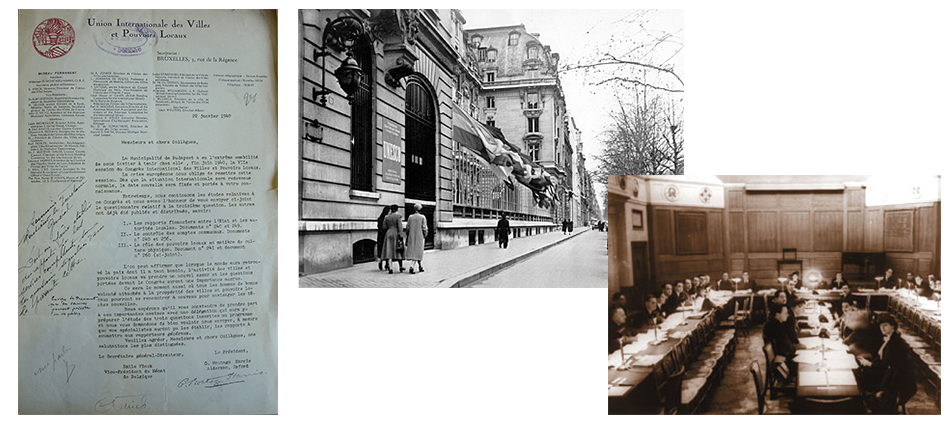
1948
Emile Vinck and Nicholas Arkema decide to move the entire Secretariat to The Hague where it will remain until 2004. In the same year, VNG President Pieter Oud, Mayor of Rotterdam, becomes President of IULA as George Montagu Harris retires, and Mr Arkema, director of VNG, replaces Emile Vinck as Secretary General of IULA. The first female Deputy Secertary-General of IULA is appointed, Ms. H.J.D. Revers, formerly Assistant Director of the Union of Netherlands Municipalities. Emile Vinck’s message upon retiring from the Union, “we pass the torch on to you, keep it burning.” The UIM holds meeting in Mont Pélerin, Switzerland, at the initiative of Eugène Wyler and Dr Hans Zbindon to bring together French and German mayors with view to re-launching dynamic exchanges and reconciliation.
1949
A total of 250 delegates participate in the IULA Conference in Geneva, Switzerland the Swedish, Danish and Norwegian unions of local authorities re-join following their departure before the war, the Germans also become members again and the newly established union of Israeli local authorities joins. Emile Vinck addresses the Conference as former Secretary General and is welcomed with great applause. The structure of the conference changes: general reports are only circulated on main subject; a spoken address is given for subsidiary issues. The agenda continues to focus on reconstruction and reconciliation. The IULA Bulletin is created featuring shorter publication summarising news and IULA events, every three months.
1950
A call by the PACH movement for a strengthening of work ties between IULA and the International Federation for Housing and Town Planning (est. 1913) as the two organisations share an office in The Hague. Emile Vinck dies a few days before his 80th birthday. Secretary General of La Fédération Andrés Voisin organises "Les Etats Généraux des Communes et Départements de France", in Versailles from 24-25 June. This meeting becomes the first step in the process that would lead, a few months later, to the creation of the Council of European Municipalities.
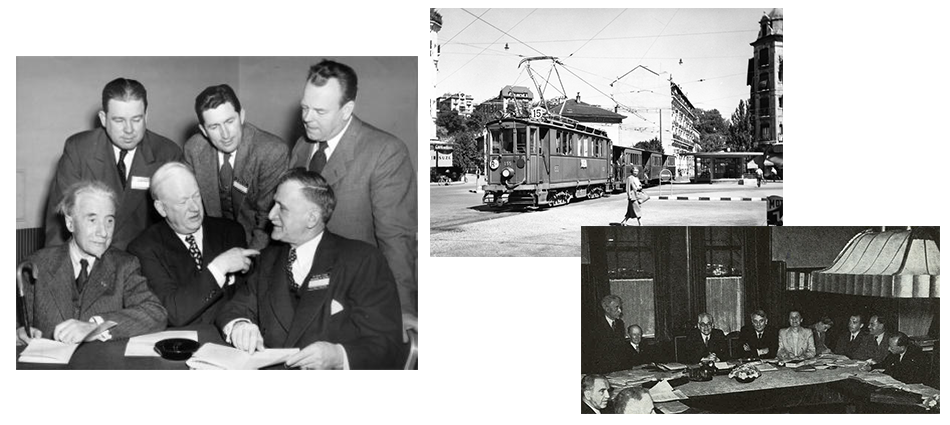
After 1950, the International Municipal Movement diversifies as new organisations, associations and unions beginning working on specialist topics.
Le Monde Bilingue, la fédération de Villes Jumelées (later United Towns Organisation), the Public Administration CAring House USA, among others, work to reinforce the links between local authorities. The presence of the local level outside of Europe and North America increases with creation of regional sections of global nertworks and development cooperation projects.
1951
Creation of the Monde Bilingue byJean Marie Bressand aiming to promote universal bilingual education. René Vettier, director of the Ecole normale supérieur of Saint-Cloud is founding president of the association. The UIM struggle to formalize a federally-inspired constitution before the Council of Europe. Following the proposal of French Minister of Foreign Affairs, Robert Schuman, on the creation of an organised Europe as a means of guaranteeing peaceful relations, a group of European mayors found the Council of European Municipalities (CEM) in Geneva to represent local interests at European level. The association is mainly composed of pro-European members of the IULA, La Fédération and UIM. IULA Congress takes place in Brighton, UK to address water supply and sewerage; local authorities and education. Mr Montagu Harris attends this congress and pays special homage to Emile Vinck.
1952
As part of the Monde Bilingue, the first twinning is formalized between Luchon (France) and Harrogate (England) with the support of the two Mayors: Alfred Coste-Floret and Don Christelow. The Monde Bilingue announces that this experiment will be composed of 3 stages: implementation of bilingual pedagogical systems in French and British towns where both languages will be taught to children at primary school; creation of bilingual towns; town twinning to allow exchanges of teachers and assistants and trade union material.
1953
The Monde Bilingue makes few advances at national level and focuses directly on the local level for support. The first General Meeting of CEM is held in Versailles and results in the publication of the charter focusing on the intentions of mayors to establish a municipal input on future supranational consultations or significant political or economic agreements between nation-states. IULA Congress is held in Vienna featuring a comparative study on “The Big City and the Small Municipalities” by Dr. Karl Honayand and with address by the Austrian Head of State, Dr. Theodore Körner. The congress ends with a ball in the Town Hall Square (Rathausplatz) to commemorate the 40th anniversary of the IULA. IULA Bulletin appears in trilingual editions: English, French, German.
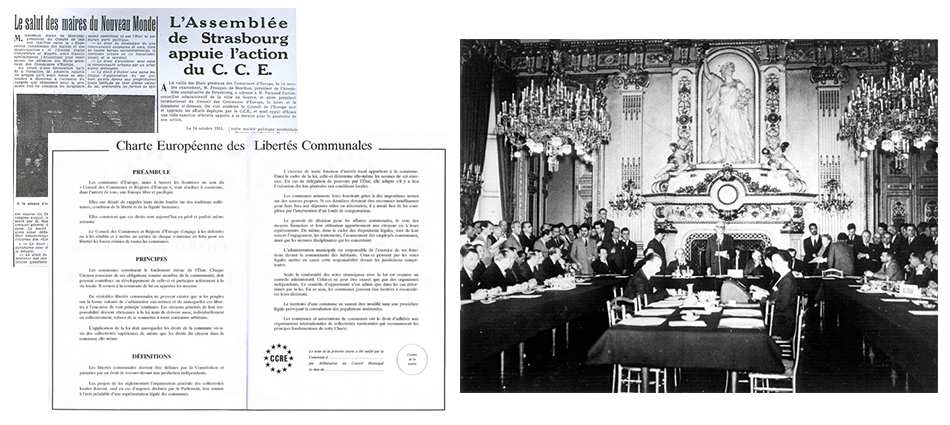
1954
Twinning actions are the centre of CEM’s activity: “Twinning is like a courtship in which one must get to know the potential partner, find out if they are interested and […] both feel that they would wish for a more permanent relationship”* Le Monde Bilingue’s twinnings go beyond the Anglo-French world: in Europe, the mayor of Neukôln (West Berlin) proposes a twinning with districts of Paris and London; in America, the Canadian Federation of Mayors and Municipalities grouping more than three hundred cities (75% of urban population) joins the Monde Bilingue.
1955
Town twinning - a hot debate during the Cold War takes place. CEM takes the line, only twin with partner towns in liberal democracies. The Monde Bilingue, and in future FMCU-UTO argue, twinning with towns in different political systems helps international understanding. The French government denounces le Monde Bilingue for its links; meanwhile Giorgio La Pira, Mayor of Florence, organises a mayors’ conference on the role of cities for peace-building – mayors from USA, USSR, and P.R. of China participate. IULA’s Congress takes place in Rome, with the main theme “Local Government Finance and Local Autonomy”. Dr Vittorio Pertusio, mayor of Genoa, draws up the conclusions of the 24 national reports in a volume that becomes an important source of comparative municipal law. His Holiness Pope Pius XII makes a special address.
1956
US President Eisenhower founds the People-to-People programme to encourage American citizens to undertake exchanges with citizens of other countries to promote cultural interaction and world peace. The Monde Bilingue announces its intention to hold a World Twinning Congress in St Etienne in 1956, with two soviet mayors confirming participation. CEM calls upon French mayors to boycott this Congress in consequence. The twinning congress is postponed to 1957 and will take place in Aix-les-Bains, Switzerland.
1957
The Monde Bilingue is extended to FMVJ – Fédération Mondiale de Villes Jumelées (later United Towns Organisation UTO in English) during the founding congress in Aix-les-Bains on 28th April with a goal of multiplying actions and efficiency by becoming involved in global programmes. The founding President is Chanoine Félix Kir, Mayor of Dijon, France. Twinning becomes an instrument of human culture, essential for bringing together populations with no regard for political party and without exclusivity. Jean-Marie Bressand addresses a letter to Edouard Herriot, who was at the same time president of CEM and honorary president of the Monde Billingue, regarding the feud between CEM and le Monde Bilingue, “Everything divides States but everything unites municipalities”. IULA holds a Congress in The Hague on the Problems of Expanding Towns; Traffic congestion in the City Centre; Local Authorities and European Economic Integration.
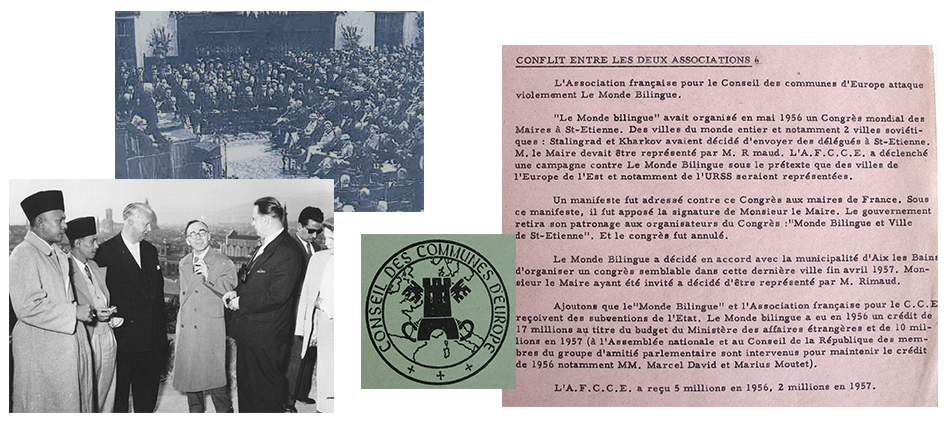
1958
In line with the People-to-People programme, Sister Cities International is created as a clearing-house for the sister city movement, the objective is to promote peace through mutual respect, understanding, and cooperation. UTO holds its second Congress in Harrogate, UK and Louis Bazerque, Mayor of Toulouse, France, is elected president. First meeting of the IULA Public Health Committee, a direct result of the working ties with the World Health Organization.
1959
First Franco-Soviet twinning conducted between Dijon (France) and Stalingrad (USSR) as part of the FMVJ-UTO movement: “Twinning is aimed at putting working class people together. In practical terms – and history can confirm this – the masses are capable of maintaining peace”, Mayor of Dijon. The IULA Congress is held Berlin and dedicated to Young People and the Care of the Aged. The opening address is given by Mr. Lodovico Benvenuti, Secretary General of the Council of Europe and the session is chaired by Willy Brandt, Mayor of Berlin. A large international presence from Asia and Africa marks an important milestone in the growth of IULA.
1960
The autonomy of local authorities is featured in the 3rd FMVJ-UTO Congress in Aosta (Italy) and a call is made by UNESCO to take into account the value of cultural exchanges at local level as the level closest to citizens. The president of FMVJ-UTO, William Callow (Lord Mayor of Coventry, UK) and Giulio Dolchi, Mayor of Aosta, welcome over 600 participants. This meeting marks the first appearance of African members and starts African twinning. A IULA Congress is also held in Tel-Aviv, Israel with special focus on the tasks of local authorities in developing areas. IULA President Oud retires and is awared a bronze, his successor is Mr A. Spinoy, Mayor of Malines, Belgium.
1961
IULA Conference is held in Washington on ‘Local Government in the USA: recent trends and developments and the problems of metropolitan areas’, with participation from over 50 countries. Two representatives, Mr. Robert F. Wagner, Mayor of New York, and Mr. G. E. van Walsum, Burgomaster of Rotterdam, present a general survey of the main problems in their towns and of local government in their countries. IULA publications reworked into a single publication issued 5 times a year, “Local Government Throughout the World” - almost exclusively in English. Intermunicipal Technical Assistance Programme initiated by IULA with the cooperation of the United Nations and funding from the Ford Foundation.
1962
4th FMVJ-UTO Congress is held in Coventry, UK and the first African President is elected, Doudou Thiam (Minister of Foreign Affairs and Mayor of M’Backé, Senegal) along with Co-President Valdiodio N’Diaye (Minister of Finances, Senegal). Over 550 delegates participate in the Congress and introduce “triangular twinning”. Since the first Congress, visa refusals have been a problem, this is addressed during the Coventry Congress. Ms. H. Revers replaces Mr Arkema as Secretary General of IULA, the first woman to hold this position.
1963
The IULA Jubilee Congress held in the former host city of the Union, Brussels. The Congress addresses ‘Local Governments in the Twentieth Century’ and celebrates fifty years of International Municipal Co-operation. A report is presented on “Problems of Maladjusted Youth.” This year also marks the creation of the Organisation of African Unity in Addis Ababa and the election of the first President, Léopold Sédar Senghor of Senegal.
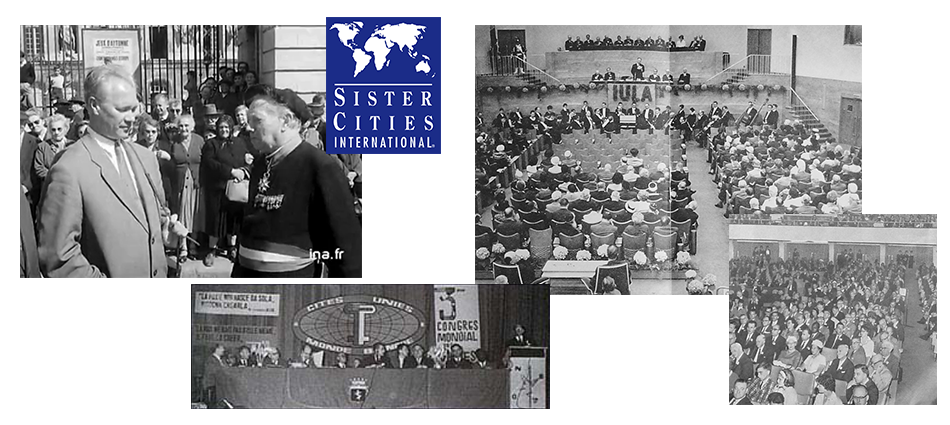
1964
The 5th FMVJ-UTO Congress is held in Warsaw, Poland, where Doudou Thiam is re-elected President. The Congress is a moment of reflection on peace and twinning in the framework of the development of cities. IULA participates in the seminars organized by United Nations on the subject “Central Services to Local Authorities”. The first was in New Delhi for Asian cities, and the second in Zaria (Nigeria) for African cities.
1965
The 17th IULA Congress is held in Belgrade. 1965 marks twenty years since the creation of the United Nations and is designated International Co-operation Year by the General Assembly on 21 November 1963. Recommendations include the issue of commemorative stamps, a calendar of activities, publicity and exchanges of information on all aspects of international co-operation, and formation of National Committees for the International Co-operation Year.
1966
The FMVJ-UTO Conference in Monastir, Tunisia, addresses, for the first time, the issue of cooperation between towns/cities through the direct collaboration of elected representatives and technical actors in twinned towns/cities. Concrete cooperation projects are organised at local level in the hope to sparking a ‘snowball effect’ of decentralized cooperation. The organization becomes better known as FMCU-UTO (Fédération Mondiale des Cités Unies). The FMCU-UTO obtains status A as non-governmental organization and the marks the beginning of direct representation of local authorities on the international cooperation scene.
1967
FMCU-UTO celebrates its 10th year during the 6th UTO Congress in Paris and president La Pira calls for summaries of the main achievements of this decade: decentralization, the right for citizens to move freely and the fight against racism, fascism, imperialism and discrimination are on the list. UTO members call for the creation of United Cities to complete the United Nations organization with specific funding for united city action. The IULA Congress is held for the first time in Asia, in Bangkok, with address by the city’s Mayor, Shaman Yuvapurna. March 15th, the Arab Towns Organization (ATO) is founded in the city of Kuwait with the aim of developing cooperation among Arab cities to promote their development, while preserving their Arab identity.
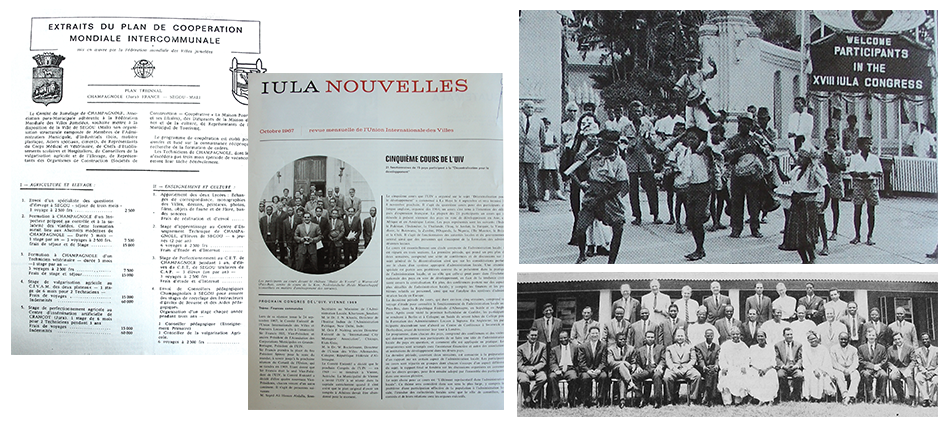
1968
Returning to the original principle of bilingualism, FMCU-UTO hold a conference in Royan, France on audio-visual methods of language learning for increased understanding among peoples. Some twenty countries are present from all corners of the globe, with a particularly high presence of African representatives. The IULA headquarters changes location from the VNG office, the new office and library are located 50 metres away from the previous location.
1969
The 19th IULA Congress takes place in Vienna at the invitation of the Mayor. During the FMCU-UTO Congress in Paris, Edgar Faure, French Minister of Education, and thirty-nine personalities sign a letter addressed to the President of the French Republic asking for support for the action of FMCU-UTO.
1970
FMCU-UTO Congress takes place in Leningrad (St Petersburg) at the Tauride Palace and sees Giorgio La Pira re-elected as President for another three years and gives a comprehensive report reviewing the various crises throughout the world. 2,000 delegates participate, among whom Honorary President Léopold Sedar Senghor, president of Senegal. The Cités Unies logo for peace is adopted to incorporate the action of FMCU-UTO in the field of cooperation in favour of development: “unite the cities to unite the nations. Create links through the cooperation of the nations of the North and South, East and West.” Giorgio la Pira. The CEM and IULA office for local and regional government representatives before the European Communities of is opened in Brussels. Foundation of the Organisation Internationale de la Francophonie.
1971
The 20th IULA Congress takes place in Toronto, Canada, from July 19-23. Felix Slavik, mayor of Vienna is elected new President of IULA (1971-1978).

1972
FMCU-UTO Congress takes place in Sofia, Bulgaria. The agenda addresses water, air, noise and waste in the City (negative effects of urbanization). On 15 September, Mr. Habib Bourguiba, president of Tunisia receives a delegation from FMCU-UTO including J.M. Bressand, and signs a degree to create the Bourguiba prize for cooperation. This prize is composed of three awards (gold, silver, bronze) and is aimed at promoting best practices and encouraging new cooperation projects. FMCU-UTO also creates an annex organism – the World Centre of Information on Bilingual Education (CMIEB) – with Mr André Martinet as president. In 2004 the centre would become the Centre of Information on Bilingual and Multi-Lingual Education.
1973
The FMCU-UTO is recognized as, “positive with regards to European construction in its representativeness” and given ‘consultant’ status within the Council of Europe. FMCU-UTO organises the “World Inter-communal Conference for the protection of the Mediterranean Sea against pollution” that takes place in Beirut, bringing together all the cities on the Mediterranean to discuss waste management and results in the adoption of the Beirut Charter. Creation of Conference of Peripheral Maritime Regions of Europe to focus on social, economic and territorial cohesion integrated maritime policy. The FMCU-UTO adopts a definitive charter on development during the Dakar Congress also held this year.
1974
FMCU-UTO Conference takes place in Bologna, Italy on urban transport, later leads to the creation of the Cooperation for Urban Mobility in the Developing World (CODATU).
1975
The 22nd IULA Congress takes place in Tehran, Iran, with the opening ceremony in the Rudaki opera hall. A report is received on “New Patterns of Urbanization”. Cités Unies France (CUF) is created by Bernard Stasi, to promote French local governments’ actions based on peace, development and solidarity.
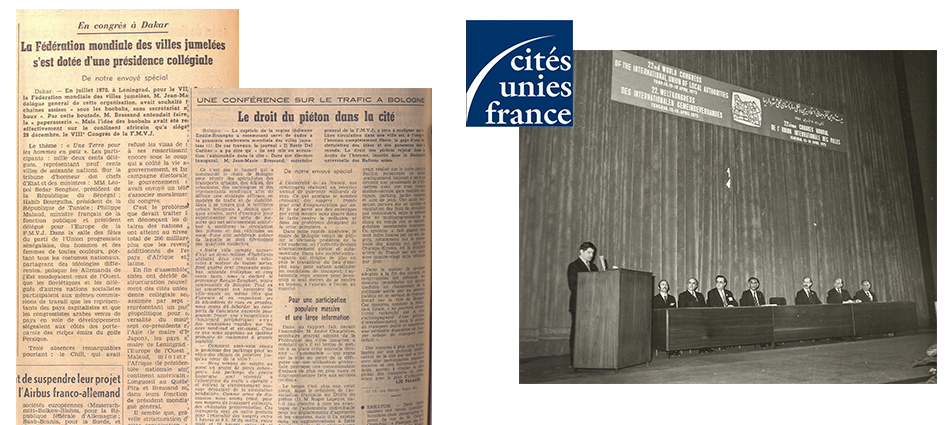
1976
The first UN Habitat Conference in Vancouver leads to the establishment of the Nairobi-based United Nations Human Settlements Programme (UN–HABITAT). A “Déclaration Commune” is signed by Jean-Marie Bressand, honorary President of FMCU-UTO and Mr. Slavick, President of IULA, in Paris to begin progressive collaboration. The text was circulated among their members for approval, but to mixed reactions.
1977
FMCU-UTO holds its 9th Congress in Pointe-à-Pitre, Guadeloupe – the 20th anniversary since its creation. Philippe Malaud is president of the FMCU-UTO for the first part of the year before being replace by Jacques Chaban-Delmas, Parliamentarian and Mayor of Bordeaux, France, and later President of the Assemblée Nationale. The 23rd IULA Congress takes place in Hamburg, Germany, on the theme "Improving the Quality of Life: a Challenge to Local Government".
1978
Amadou Cisse-Dia, Parliamentarian and Mayor of Kaolack, Senegal, succeeds Jacques Chaban-Delmas as President of FMCU-UTO. This year also marks the 75th anniversary since the creation of IULA.
1979
The Association Internationale de Maires Francophones (AIMF) is created on the initiative of the mayors of Paris and Québec, Jacques Chirac and Jean Pellicier. The 24th IULA Congress takes place in Manila, Philippines. A report on local govenment finances in 24 countries is given to the delegates.
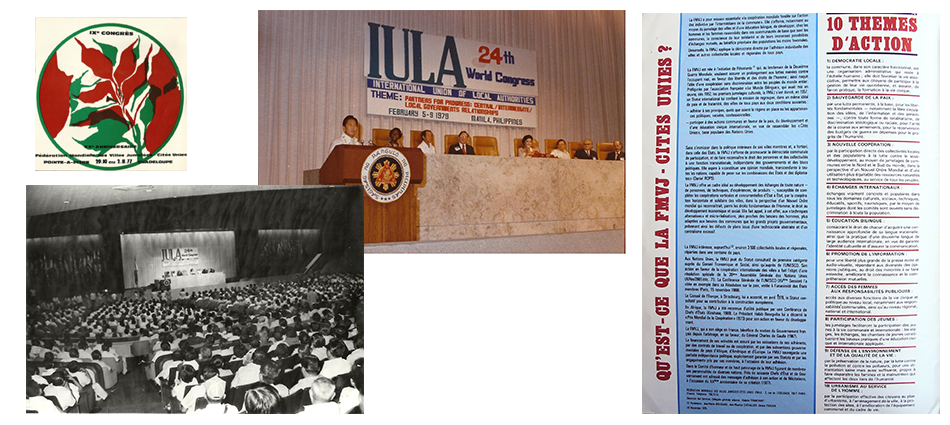
1980
Diego Novelli, Mayor of Turin, becomes President of FMCU-UTO, succeeding Amadou Cisse-Dia, mayor of Kaolack, Senegal.
1981
The 10th FMCU-UTO Congress takes place in Casablanca, Morocco. Enrique Tierno-Galvan, Mayor of Madrid, is elected as President. IULA holds its 25th World Congress, in Columbus, Ohio (USA). On 17th November, the Latin American Regional Section of IULA is founded with its seat in Quito, Ecuador. Originally known as IULA-LATAM, and with a technical arm CELCADEL, it is now FLACMA and Latin American regional section of UCLG. The 14th CEM General Assembly symbolically takes place in Madrid, marking the return of democracy to Spain after the Franco dictatorship.
1982
The FMCU-UTO celebrates 25 years. The Council of Europe holds its 17th Session of the Conference of Local and Regional Authorities of Europe and adopts Resolution 126 on the principles of local self-government.
1983
First “Meeting of women local and regional elected representatives of the European Community” in Pisa, hosted by Mayor Fausta Giani Cecchini (CEMR) and at the initiative of CEMR.
1984
The 11th FMCU-UTO Congress is held in Montreal, Canada, followed by the CEM Assembly General in Turin, Italy with participation by the President of Italy, Mr. Pertini. Pierre Mauroy, Mayor of Lille, starts his term of office as FMCU President, which continues until 1992. The Council of European Municipalities (CEM) becomes CEMR – the Council of European Municipalities and Regions. The African Union of Local Authorities, AULA, is founded as the African Section of IULA, with its secretariat based in Harare, Zimbabwe. IAURIF (now IAU Ile de France) organises an international conference, "Metropolis 84", to address the topic, "the problems and future of major metropolises" in Paris.

1985
Official creation of the World Association of the Major Metropolises (Metropolis) in Montreal, with Michel Giraud, President of the Regional Council of Ile de France (Greater Paris) Founding President. The 27th IULA Congress takes place in Rio de Janeiro, and promulgates the IULA Universal Declaration of Local Autonomy. SUMMIT (the Conference of Major Cities of the World) is launched in Tokyo at the invitation of Mr Suzuki, Administrator of Tokyo. It offers a forum to discuss urban management and the role of cities in maintaining peace. The Council of Europe’s European Charter of Local Self-Government is adopted in Strasbourg and opened for member state signatures – the first international treaty to lay down norms of local democracy.
1986
The FMCU-UTO Conference against apartheid takes place in Dakar, Senegal, on the 10th anniversary of the Soweto Uprising (16th June, 1976). Eurocities is created by the Mayors of six large cities: Barcelona (Spain), Birmingham (UK), Frankfurt (Germany), Lyon (France), Milan (Italy) & Rotterdam (Netherlands).
1987
The 28th World Congress of IULA is organised in Rome, with special address by the Pope. The 12th FMCU-UTO Congress is held in Grenoble, France. FMCU-UTO is designated as “Messenger of Peace” by the United Nations. Metropolis holds its 2nd World Congress, "A Better Life for All in Metropolises", in Mexico City. CITYNET is officially established at the Nagoya Congress (N'LAP) in Japan with the support of UNESCAP, UNDP, UN-HABITAT, the City of Nagoya and 27 members. IULA-EMME, today known as UCLG-MEWA, is established in Turkey as the middle-eastern regional section of IULA. IULA publishes “African local governments as instruments of economic and social development by Dele Oluwu.

1988
The FMCU-UTO “Ciudagua” international Latin-America-Europe cities conference on water and sanitation for poorer neighbourhoods is held in Montevideo in Uruguay (1-8 august). The European Charter for Local Self-Government comes into force, having obtained anough signatory states. By 2013, 46 out of 47 Council of Europe member states have ratified the Charter. IULA publishes “African local governments as instruments of economic and social development” by Dele Olowu.
1989
United Cities Development (CUD), the technical programme structure for FMCU-UTO, is created. It facilitates larger scale action and the inclusion of new actors in development aid and urban management. The 29th IULA Congress is organised in Perth, Western Australia. IULA’s Asia and Pacific Regional Section (ASPAC) is launched, with the presidency of the Governor of Jakarta Wyogo Atmodarminto. The CITYNET Charter is adopted. The European Community, thanks to the European Parliament, creates its first funding programme for town twinning, which will later evolve into the Europe for Citizens programme.
1990
The 13th FMCU-UTO Congress is held in Cordoba, Argentina. Metropolis’s 3rd World Congress, “Metropolises in Ascendancy?” takes place in Melbourne. ICLEI (now Local Governments for Sustainability) is established when more than 200 local governments from 43 countries came together at the World Congress of Local Governments for a Sustainable Future, at the United Nations in New York. In Europe, a fusion of CEMR with IULA’s European Committee takes place, with CEMR also becoming the European regional section of IULA.
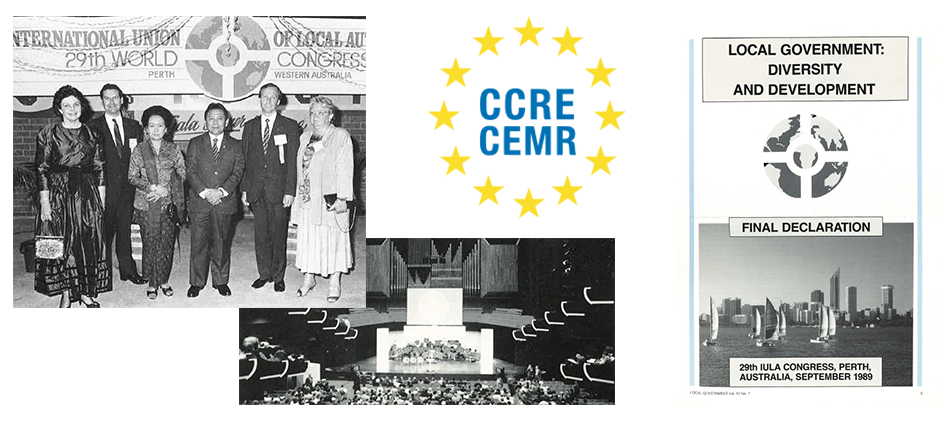
Creation of G4, G4+ and CAMVAL promotes coordination among local level actors and their representative organisation on the international scene. Overcoming differences in fields of activities, approaches and membership of municipal actors results in increased recognition of the effectiveness of the local level in international development cooperation and policy making.
The tone of the local level coordination moves from temporary to permanent as the goal of establishing a unified voice for local and regional authorities from across the globe and working on a spectrum of activities is finalised.
1991
The 30th IULA Congress takes place in Oslo, Norway, and adopts the Oslo Declaration on environment, health and lifestyle. CEMR celebrates 40 years since its creation.
1992
The United Nations organises the Conference on the Environment and Development (“Earth Summit”) in Rio de Janeiro. For the first time, local authorities are recognized as a “major group” and help draft Chapter 28 of Action 21. From this, Local Agenda 21 is launched, which swiftly gets thousands of local governments and communities across the world engaged in sustainable development. The creation in Curitiba of the “G4” coordination, composed of FMCU, IULA, Metropolis and SUMMIT marks this mobilization. Jorge Sampaio, Mayor of Lisbon, is elected FMCU-UTO President. He will play an active role in pressing for the world’s cities to unite.
1993
United Cities Development (CUD) receives prize for “model for decentralized Cooperation” awarded by UNCHS Habitat. Metropolis’ 4th World Congress takes place in Montreal, on “Citizens and Sustainable Development”. It sets up a new Technical Assistance Service to facilitate exchanges between members. IULA holds its 31st World Congress in Toronto, Canada, and adopts the amended World-Wide Declaration of Local Self-Government. The ICLEI Executive Committee meets in Tokyo on the occasion of the International Conference of Eco-Cities. ICLEI-Europe establishes cooperation programmes with European Commission.
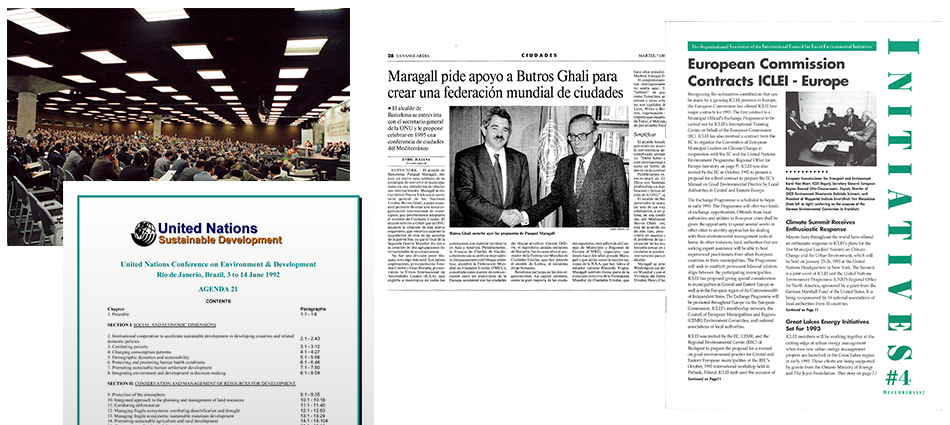
1994
FMCU-UTO’s 14th Congress is hosted in Lisbon, Portugal, home city of its President Jorge Sampaio. Mr Riccardo Triglia, President of IULA, is invited to address the participants, and Metropolis is also represented. The “G4” coordination is extended to become “G4+”, incorporating world regional associations - CEMR, United Arab Towns, Citynet, Union of African Cities. This grouping begins to prepare for the 1996 UN Cities Summit (Habitat II).
1995
The 32nd IULA World Congress is organised in The Hague, on the theme of Municipal International Cooperation. Jaime Ravinet, Mayor of Santiago de Chile, is elected IULA President. The Commonwealth Local Government Forum (CLGF) is founded as a focus for action on local democracy in the Commonwealth. Today, CLGF has members in 40 countries. The Dubai Award for local governments’ best practices is launched by Sheikh Maktoum Bin Rashid Al Maktoum at a UN International Conference held in the city. It is jointly organised with UN Habitat. Jon Trickett, Leader of Leeds City Council, UK, becomes FMCU-UTO President. ICLEI USA is launched and grows from a handful of local governments participating in a pilot project to a solid network of more than 600 cities, towns and counties actively striving to achieve tangible reductions in greenhouse gas emissions and create more sustainable communities.
1996
The UN Habitat II Conference, “the City Summit”, is held in Istanbul. The Habitat Agenda is adopted, later formally approved by the UN General Assembly. This sets out policies and actions to achieve adequate shelter for all and sustainable human settlements development. The conference sees Local authorities recognised by governments as ‘our closest partners’ and capacity building for local authorities is identified as a priority. Also in Istanbul, the G4+ organises the World Assembly of Cities and Local Authorities (WACLA) which adopts a Declaration asking the international associations to co-ordinate more closely and develop relations and work with the UN system. At a meeting in Paris, this coordination is set up, known as “WACLAC”. Daby Diagne, President of the Louga Region, Senegal, becomes President of FMCU-UTO. Metropolis’ 5th World Congress is held in Tokyo, entitled “Metropolis for the People: Seeking Solidarity among World Citizens”.
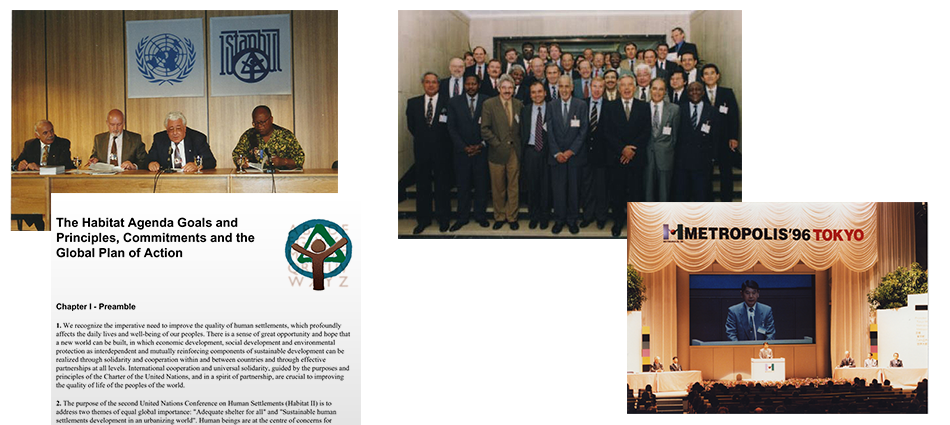
1997
IULA holds its first-ever African World Congress in Mauritius, on the theme, “Local Governance for the Third Millennium: Decentralization, Diversity, Partnership in the Global Village”. Norbert Burger, Mayor of Cologne, becomes IULA President. In his acceptance speech he says he is “determined to work for the aim of unification [with FMCU-UTO] within my term of office”. The WACLAC Council of Presidents meets in Nairobi at the UNCHS premises. IULA launches Association Capacity Building Programme, funded by Dutch government – the first Programme involving all continents and linking Local Governments Associations of North and South.
1998
IULA celebrates the 50th anniversary of being based in The Hague. FMCU-UTO holds its 15th Congress in Lille, France. President Diagne invites IULA President Burger to address the Congress, as a step towards unity. Both IULA and FMCU-UTO agree to open negotiations towards unification. IULA’s World Executive Committee votes to withdraw from WACLAC while supporting unification with FMCU-UTO, but defers the deadline for leaving. The IULA Declaration on Women in Local Government is adopted in Harare, Zimbabwe. Joan Clos, Mayor of Barcelona, succeeds Michel Giraud as President of Metropolis, whose Board meets in Seoul. The first Africities Summit is held in Abidjan, Ivory Cost on the theme of “acknowledging the irreplaceable role of local governments in the development of Africa”.
1999
IULA and Metropolis hold back-to-back Congresses in Barcelona. The theme of IULA’s 34th Congress is “Local Government Uniting in a Global Mission”. Max Ng’andwe, Zambia, becomes IULA’s first African President. IULA votes to admit the Chinese People’s Association for Friendship with Foreign Countries to membership, opening the way for Chinese cities to become involved. Joan Clos is re-elected President of Metropolis, whose secretariat moves to Barcelona. FMCU-UTO organise a Euro-Mediterranean conference of cities in Seville (Spain). UN Habitat and WACLAC launch a consultation process towards a World Charter of Local Self-Government. This initiative will later be blocked by several member states.
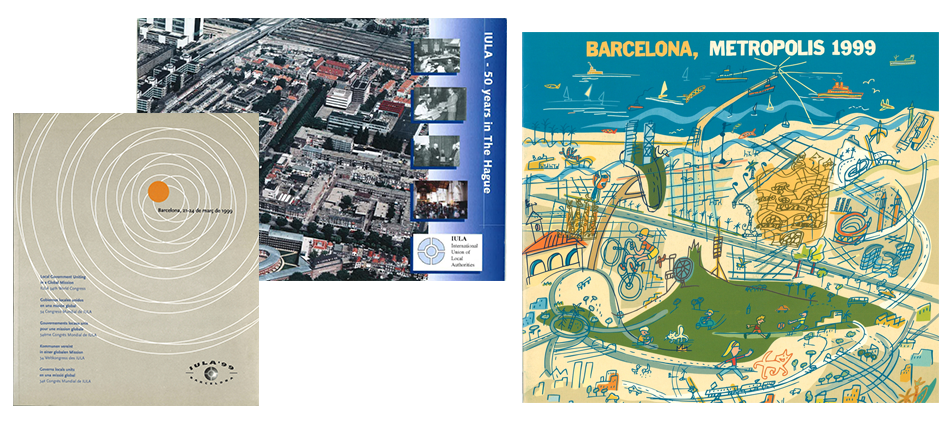
2000
Joan Clos and Daby Diagne become Presidents of WACLAC. A delegation of Mayors is received in Washington by James Wolfensohn, President of the World Bank. The IULA World Executive Committee meets in Merida, Mexico, at the invitation of the Association of Mexican Municipalities. By a majority of one, it votes not to end the process of unification with FMCU-UTO. It also adopts a Declaration in support of Human Rights of Local Government Officials in Colombia, many of whom had been killed. The 2nd Africities Summit takes place in Windhoek, Namibia on “Financing African Local Government to Strengthen Democracy and Sustainable Development".
2001
FMCU-UTO and IULA hold a Unity Joint Congress in Rio de Janeiro. Alan Lloyd (Swansea, UK) is elected President of IULA; Mercedes Bresso (Province of Turin) becomes President of FMCU-UTO. The first IULA-UTO Joint Executive Session takes place in Turin; Paris is chosen as venue for the first UCLG Congress. In New York the UN General Assembly’s adopts a “Declaration on Cities and Other Human Settlements in the New Millennium”; UN Secretary General Kofi Annan receives Joan Clos, President of WACLAC, with UTO and IULA Presidents Diagne and Burger, and takes part in WACLAC’s mayors’ meeting. The first World Social Forum, in Porto Alegre, Brazil, includes a Forum of Local Authorities for Social Inclusion.
2002
Metropolis’ 7th World Congress is held in Seoul, “Metropolitan Governance in the new Millennium”. At UTO-IULA’s Joint Executive Session in Guadalajara, Barcelona is chosen as seat of the new world organisation, UCLG. The next Joint Session is held in Tunis. In October, IULA’s Council votes to legally dissolve IULA, in view of UCLG’s creation, with practical effect from 31st December 2003. In Johannesburg, ICLEI, IULA and UTO organise their conference in parallel with the UN World Summit on Sustainable Development. The Summit’s Action Plan asks states to enhance the role and capacity of local authorities in implementing Local Agenda 21.
Nrg4SD (Network of Regional Governments for Sustainable Development) is created, linking subnational regions from 30 countries.
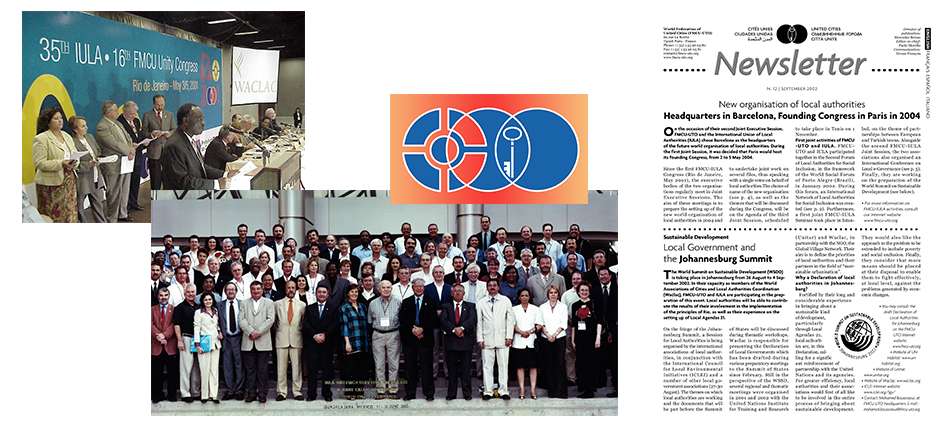
2003
US conference of Mayors in Denver sees participation of President of Metropolis. 22nd CEMR General Assembly in Poznan: first GA in a Central and Eastern European country. Africities takes place in Yaoundé, Cameroon.
The fusion of the two largest organizations of local authorities, the International Union of Local Authorities and United Towns Organization, with the support of the Metropolitan organization, METROPOLIS, is a milestone in the coordination of local and regional authorities on the international scene.
United Cities and Local Governments advocates on behalf of all local and regional authorities, from all corners of the world, to increase their role and influence and to become the main source of intelligence, best practices and support for democratic, effective and innovative local government.
2004
Official creation of the world organization “United Cities and Local Governments” to promote and represent local governments on the world stage. Bertrand Delanoë nominated first President. The UCLG Euro-Asian and the UCLG Asia-Pacific Sections are created in Kazan and Taipei respectively. First UCLG World Council takes place in São Paulo with participation by Brazilian President Luiz Lula da Silva. Framework agreement signed between UCLG and the World Bank to collaborate in improving living standards in the developing world. Agenda 21 for Culture is agreed by 198 local governments demonstrating commitment to human rights, cultural diversity and participatory democracy. A cooperation agreement is signed between UN-Habitat and the local government movement to promote the adoption of international policies on decentralisation.
2005
The first UCLG Committees and Working Groups are established during the UCLG World Council in Beijing, China and cover 18 different topics. Local Governments are given an advisory role at the UN through the United Nations Advisory Committee of Local Authorities (UNACLA). At the Millennium+5 Summit in New York, United Nations Secretary General Kofi Annan meets a UCLG delegation of Mayors. The Final Declaration of this Summit recognises local authorities as actors in the achievement of the MDG. METROPOLIS holds it 8th Congress in Berlin on the “Tradition and Transformation, the future of the city”.

2006
The UCLG Executive Bureau meeting takes place in Washington where the World Bank President expresses interest in strengthening relations with UCLG and commitment to developing new instruments to support city development. March, the World Water Forum sees governments from all corners of the globe acknowledge that local authorities play a major role in delivering a sustainable access to water and to sanitation services. During the UCLG World Council in Marrakech, over 500 local government leaders agree to support the United Nations Alliance of Civilisations in promoting peace and dialogue between communities and express their commitment to Access to Basic Services and the achievement of the MDG. European Charter for equality of women and men in local life launched by CEMR.
2007
In April the Governing Council of UN Habitat adopts the International Guidelines on Decentralisation and teh strengthening of local authorities. For the first time, an international legal framework on the decentralisation process and placing it at the forefront of international policies. In October, the Second UCLG World Congress takes place in Jeju, South Korea, with attendance of 2,000 mayors and local governments to discuss the consequences of urban expansion, cooperation with regions and the challenges for the city of tomorrow. UCLG sets out to compile the first ever comprehensive study project on the state of decentralization by setting up the Global Observatory on Local Democracy and Decentralisation (GOLD). The Forum of Regional Government and Global Association of Regions (FOGAR) are created in Cape Town, South Africa, in August.
2008
UCLG stands at the forefront on slum upgrading as it becomes Chair of the Executive Committee of Cities Alliance. September, the Hague Agenda for City Diplomacy develops a concrete work programme for local and regional authorities on the international scene. November, PLATFORMA is created to facilitate dialogue between the European institutions and local and regional authorities. GOLD I Report demonstrates the progress of local autonomy throughout the world during the two previous decades. Launch of the European Covenant of Mayors: mainstream movement involving local authorities committed to increasing energy efficiency in their territories. First meeting of the Asian Mayors Forum hosted by Dr. Qalibaf, Mayor of Tehran, leads to the creation of a permanent secretariat.

2009
April, Local and Regional Authorities stress their role in peace and dialogue at the Second Forum of the UN Alliance of Civilizations. Local governments speak with one voice during the COP 15 on Climate Change in part owing to the Local Government Climate Change Leadership Summit gathered by UCLG and partners. The UCLG Position Paper on Aid Effectiveness and Local Government is adopted during the World Council in Ghangzhou, recalling the contribution of Local and Regional Authorities in the field of aid and development through decentralized cooperation and peer-to-peer partnerships.The Association Internationale des Maires Francophone celebrates 30 years. 5th Africities summit is held in Marrakech, Morocco.
2010
The UCLG Third World Congress of UCLG, First World Summit of Local and Regional Leaders is held in Mexico City where 3,000 delegates gather to discuss critical issues facing our world in each continent. Participants agree on a set of initiatives, priorities and actions. The Manifesto of the City for 2030 and the GOLD II Report on Local Finances are published. The World Urban Forum takes place in Rio de Janeiro, Brazil, on the Right to the City: Bridging the urban divide. Launch of ARLEM: a Euro-Mediterranean Regional and Local Assembly representing the local and regional dimension in the Union for the Mediterranean (Luc Van den Brande, President of the Committee of Regions, and Mohamed Boudraa, President of the region of Taza-Al Hoceima-Taounate, Morocco, are elected Co-Presidents).
2011
May, UCLG President, Kadir Topbaş personally meets UN Secretary General, Ban Ki-Moon, and advocates for a special status for UCLG before the General Assembly of the United Nations. UCLG organizes a side-event on the 4th High Level Forum on Aid Effectiveness in Busan (Korea) promoting adequate decentralisation, strengthened local governance and increased promotion of decentralised cooperation in order to improve aid effectiveness. A Standing Committee on Gender Equality is created in order to push forward the participation of women in local decision making. The Council of European Municipalities and Regions celebrates 60 years “building Europe from the ground up” since its creation. The second meeting of Asian Mayors Forum in Istanbul is hosted, Kadir Topbaş, Mayor of Istanbul.
2012
The UN Secretary General, Ban Ki-Moon welcomes Local and Regional Authorities to the UN Headquarters and the group presents their key messages for Rio+20 Summit. Outcome Document acknowledges for the first time the role that local and regional governments play in the sustainable development agenda. July, Ban Ki-moon nominates Kadir Topbaş as a member of the post-MDGs High-Level Panel of Eminent Persons, as recognition of local and regional governments’ role in the Millennium Development Goals. UCLG adopts Policy Paper on Local Governments and Cooperation and Development calling for a sufficient financing that would allow local governments to participate to the cooperation and development. The Guangzhou award for Urban Innovation takes place in Guangzhou, China. 4th UCLG ASPAC Congress takes place with focus on resilient cities. The 6th Africities summit takes place in Dakar, Senegal.











